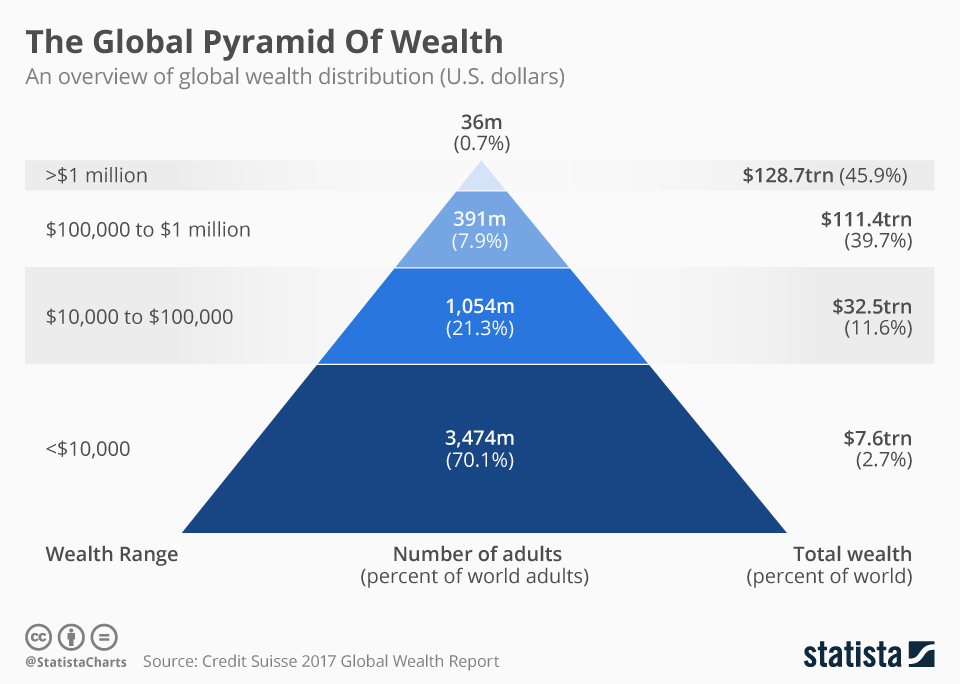Poverty and Capitalism in the 21st Century
The work to end extreme poverty is far from over, and a number of challenges remain.
Access to good schools, healthcare, electricity, safe water, and other critical needs remains intangible for many people.
According to World Bank, 1 in 10 people in the world live under $1.90 a day. In third world countries, between one quarter and one-third of children die before reaching five years – in the poorest countries, this number is closer to half.
Population below poverty line
And all of this is happening while a handful of people in the world control more wealth than 3.6 billion people.

Infographic: The Global Pyramid Of Wealth | Statista You will find more statistics at Statista
People are not born in a world of poverty and lack of resources. Almost half of the world’s food production is thrown away as you can see in these images:


We know we have more than enough resources and human energy to offer clothing, feed, educate, provide medicines and intellectual development for the entire world population. Failure to fulfill such objectives has to do with how our social relations are organized – in short, capitalism.
How is it that poverty is created by capitalism? Exactly the same way it creates profits – through the work of human beings. Poverty and profits are two sides of the same coin. Those defenders of capitalism emphasize that the system creates a huge wealth but fail to tell us that the wealth it produces is the result of a simple transfer – in terms of human energy, ideas, and actions – the majority belonged to a minority holding power. This transfer gives rise to financial profit.
The capitalist brings financial and material resources and the employee shall provide the workforce. Each contributes something, but the fruit of their collaboration is never divided equally. The employer has the time and labor of the worker simply because the latter has no means of production and forced to sell their labor power to live. Therefore, the employer is the one who sets the rules.
Usually, the ordinary worker is not a person who lived irresponsibly and didn’t know how to manage their wealth. Most often, he or she is someone who has never had much choice. That’s because their livelihoods have accumulated over time in the hands of others.
That means work in capitalism and that poverty is an issue closely related to the labor issue.
Of course, this is just a very short analysis of this matter at hand. On my future posts I will try to offer a more complex point of view.
Poverty is the default state of man. How do you think life for humans was ~100'000 years ago? Abject, helpless, hopeless poverty. No shelter, no highly probable sources of food, nothing to protect against weather, nothing to stop the person from getting eaten by a bear. All the scarcities you take for granted to be redistributed equally were even more unevenly distributed among people. Instead of asking "what causes poverty", ask "what leads to prosperity." Freedom of association and trade and allowing of capital accumulation is the only thing that leads to prosperity.
Look at Botswana for instance, that instead of adapting Marxism after the colonial powers left (like neighboring Zimbabwe), adopted market freedom / laissez faire = resulting in the GDP growing from $70 per year in 1966 to about 20000 today = excessively greater living standards for the individuals.
Obviously it also very much depends on how you define "poverty." Usually we automatically take, say, the bottom 10% in terms of income or wealth and label them "poor." With this definition we will always have poverty, since there will always be a "bottom 10%". With this we ignore that the bottom 10% have excessively better living standards than compared to 100 years ago, correlating with market freedom that has flourished in SPITE of the state.
And if you look at nations like India and Bangladesh, the reason for why people are poor is not capitalism, but rather a lack of freedom. The labor of people in failed socialist states are worth so little compared to people in nations where trade is free/freer because of tariffs, government licensing and restrictions on market freedom, which basically give certain international companies monopoly. Peoples labor in Bangladesh or other third-world nations, which are usually very authoritarian and government heavy, are worth only three dollars a day simply because company X pays for a license from the Bangladeshi government to be allowed to hire workers, which results in that nobody else can compete for the workers. So here you have a situation where company X has bribed the government to get special privileges and the exclusive monopoly access to these workers = the wages will remain low. Also lack of freedom of association is a problem, such as workers forming voluntary unions, which is outlawed in many of these nations and will result in heavy jail sentences.
Congratulations @blackellis! You received a personal award!
Click here to view your Board